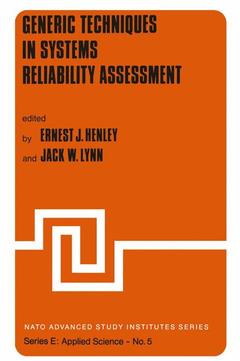Description
Generic Techniques in Systems Reliability Assessment, Softcover reprint of the original 1st ed. 1976
Coll. NATO Science Series E:, Vol. 5
Coordinators: Henley E.J., Lynn J.W.
Language: French
Keywords
Publication date: 02-2012
502 p. · 15.5x23.5 cm · Paperback
502 p. · 15.5x23.5 cm · Paperback
Description
/li>Contents
/li>
The NA TO Advanced Study Institute is, to quote the Notes for Applicants "primarily a high level teaching activity at which a carefully defined subject is presented in a systematic and coherently structured programme. The subject is treated in considerable depth by eminent lecturers . . . . ??. . . " The NATO ASI on Generic Techniques in Systems Reliability Assessment was held at the University of Liverpool and the Proceedings are presented in the present volume. Regrettably many of the papers are in shortened version. This was an inter disciplinary assembly designed to focus on the synthesis of generic reliability concepts and technology and to discuss relevant teaching and research in universities and colleges. One important objective was, of course, to give opportunity for interchange of information on advanced techniques in reliability in various fields. The Institute was held in Dale Hall, one of the halls of residence of the University of Liverpool, England, from 17th to 28th July, 1973. Sixty-four engineers from twelve countries attended, namely, 27 from U. K. , 14 from U. S. A. 8 from Italy, 4 from West Germany, 2 from France, 2 from the Netherlands, 2 from Sweden each from Belgium, Canada, Denmark, India and Norway. and one Seven of these had their wives and some brought their children also. The technical affiliations which were represented were 23 universities, 22 national laboratories, 11 industry, 5 military, 3 consultants.
A Preliminary Model for Achieving Optimum Reliability Investment in Chemical Plants.- Development of Systems Reliability Models from Basic Physical/Mathematical Concepts.- A Technique for Selectively Reducing Small Sample Error in Maintainability Demonstrations when Apportionment is Based upon Predicted Reliability.- On Definitions of Software Reliability and Computing Reliability.- On Some Objective Functions for Reliability Optimization.- A Comment on Reliability Evaluation of Software.- Power System Reliability Indices.- Reliability Techniques in Assessment of Nuclear Reactor Safety.- Digital Analysis of an Electronic Amplifier for Reliability Studies.- Operation of a Reliability Data Bank.- Reliability Optimization.- A Test Methodology Allowing Trade-Off of Reliability/Maintainability Requirements.- Fault Tree Analysis: Concepts and Techniques.- Optimal Availability of a Complex System.- A Review of System Reliability Assessment.- Security Assessment of Power Systems.- A Reliability/Maintainability Data Feedback System.- Design for Man-Machine System Reliability in Process Control.- Risk Indices for Evaluating the Reliability of an Electrical System.- Reliability in Mechanical Design and Production.- The Analysis and Synthesis of Safe and Serviceable Structures.- Fundamental Probability Relations for Repairable Items.- Unavailability of Statistical Models for Power System Reliability Studies.- Computer-Aided Synthesis of Fault Trees for Complex Processing Systems.- The Role of the Man-Machine Interface in Systems Reliability.- Human Performance Reliability Modeling in Time Continuous Domain.- Optimization of Redundant Systems: a Non-linear Programming Approach.- Software Reliability: Analysis and Prediction.- Application of Reliability Theory to Computation of System Operation Security in a Power Industry.- Shortcuts in Human Reliability Analysis.- Recent Developments in the Prediction of Human Operator Performance.- Some Design Aspects of Electrical Power Distribution System Reliability.- Reliability, Redundancy and Cascaded Priorities in Psysiological Systems.- Distribution of Time-to-Damage Method in Reliability of Pipes.- Group Reports.- Attendance.
© 2024 LAVOISIER S.A.S.




